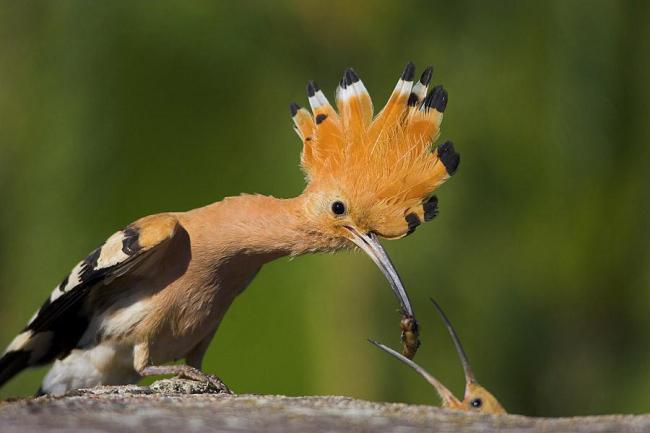When King Solomon (הַמֶּלֶךְ שְׁלֹמֹה) felt overwhelmed with his royal job, he used to take vacations in a special city called Tadmor that he built for this purpose in the middle of the desert. He used to fly there for few days on his personal White Eagle, (נֶשֶׁר לָבָן) and when he came back he felt refreshed and ready to rule his people (and animals).
On one of his flights the sun shone vigorously and King Solomon almost passed out from heatstroke. The king of the Hoopoes saw him and called his flock to create a bird-cloud to shade the fainting king and rescued him. To thank the hoopoes, King Solomon promised to fulfill a wish for them. So, the hoopoes discussed it for a whole day and decided to ask for a golden crest (צִיצַת זָהָב) of feathers. King Solomon told them that if they decided their wish was futile, he didn’t mind helping them again.
The hoopoes received a golden crest and were overjoyed. They began acting like narcissists, looking at their reflection in the water all the time. A hunter watched the hoopoes boasting and put a small mirror on the ground. When a hoopoe came to watch itself he hunted it and sold its golden crest. When others heard about the “flying treasure,” many people began hunting the hoopoes to become rich. The hoopoes were in trouble. As a last resort, the king of the hoopoes went back to King Solomon, begging him to rescue his birds from extermination. King Solomon, understanding that the hoopoes had certainly learned their lesson, took pity upon them and removed the gold from their crest. Ever since, the hoopoes have been content with their lot and behave modestly, but still seem very glorious even with their non-golden crest (צִיצָה).
Here is an excerpt from the beginning and end of a lovely song by Oded Hillel about the hoopoe. The poet rhymed דּוּכִיפַת (dukhifat) with מָה אִכְפַּת (ma ‘ikhpat) which means “who cares?”
?בְּיוֹם הַשַּׁבָּת פָּגַשְׁתִּי דּוּכִיפַת וְשָׁאַלְתִּי: מַה שְׁלוֹמֵךְ, מַה שְׁלוֹמֵךְ, דּוּכִיפַת
Beyom haShabat pagashti dukhifat vesha’alti: ma shlomekh, ma shlomekh, dukhifat?
On Saturday I met a hoopoe and asked: How are you? How are you hoopoe?
לֹא אִכְפַּת, לֹא אִכְפַּת, – אָמְרָה הַדּוּכִיפַת
Lo ikhpat, lo ikhpat, – amra hadukhifat. I don’t mind, I don’t mind, said the hoopoe.
וּמָה הַשָּׁעָה, אוּלַי אַתְּ יוֹדַעַת? לֹא אִכְפַּת, – אָמְרָה הַדּוּכִיפַת
Uma hasha’a? Ulay at yoda’at? – Lo ikhpat, lo ikhpat, – amra hadukhifat.
And what’s the time, do you know? I don’t mind, I don’t mind, said the hoopoe.
?אָז מַה בְּסוֹפוֹ שֶׁל דָּבָר אִכְפַּת לָךְ וְאִכְפַּת
Az ma besofo shel davar ikhpat lakh ve’ikhpat?
So what, after all, do you care about?
!אֲנִי לְעַצְמִי, אֲנִי הַדּוּכִיפַת מְאוֹד מְאוֹד אִכְפַּת
Ani le’atsmi, ani hadukhifat me’od me’od ikhpat!
I care about myself, the hoopoe very much!
אָמְרָה הַדּוּכִיפַת וּכְמוֹ שֶׁאָמְרָה פָּרְחָה בְּבַת אַחַת. וְלָמָּה? כִּי חָתוּל רָעֵב מְאוֹד הֵצִיץ בָּהּ מִן הַצַּד
Amra hadukhifat ukmo she’amra parxa bevat axat. Velama? Ki xatul ra’ev hetsits ba min hatsad.
Said the hoopoe and as she said she flew away at once. And why? Because a hungry cat glanced at her from the side.
eTeacherHEBREW.com



So pretty!